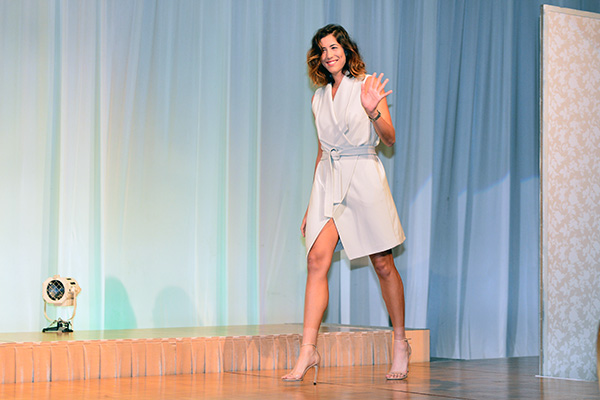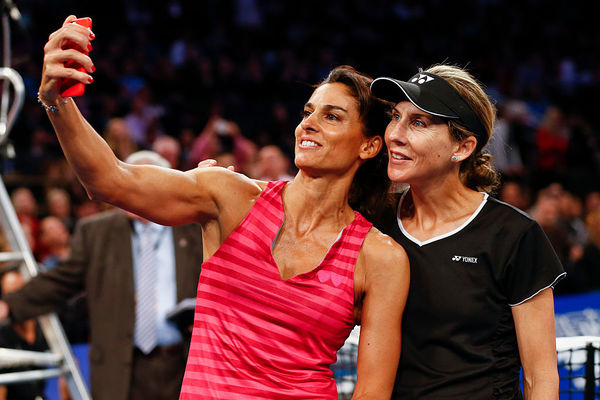The BNP Paribas WTA Finals Singapore presented by SC Global are just a month away, and 30 days out from the culmination of an exciting 2016 season, the WTA has announced that former No.1 and three-time WTA Finals champion Monica Seles will serve as a tournament ambassador – joining fellow WTA Legends Chris Evert, Martina Navratilova, and Arantxa Sanchez-Vicario. Seles will be traveling to Singapore for the first time in over two decades.
“Last time I was there was back in 1990, when I played Jennifer Capriati in a one-night exhibition,” Seles said in a conference call Thursday morning. “I never really got the chance to see much of the city.
“It’s a great honor to be back at the WTA Finals, where you get to see the best tennis champions, who work hard all year to be in the group. There are no easy matches; every match is like a Grand Slam final. We still have some open spots on the Road to Singapore with 30 days out, and it’s a lot of pressure for them.
“But for me, I’m just really excited and honored to be one of the Ambassadors for the tournament, and I very much look forward to coming back to Singapore and seeing all of the fans there.”

A nine-time Grand Slam champion, Seles qualified for the WTA Finals nine times through her Hall of Fame career, winning a hat trick of season-ending championship titles between 1990 and 1992. Her fondest memory of the tournament remains her first victory, when she overcame a tremendous five-set fight with Gabriela Sabatini in New York City’s Madison Square Garden.
“Looking back on my career, with all the Grand Slams and tournament wins, that one match stands out the most. You go in knowing it’s the last match for quite some time, and I’d worked all year to be part of the WTA Finals, winning all these matches that week to be in the final.
“That feeling that I had in the match, knowing I finished the year by winning the season-ending championships, even when I was already No.1 in the world, it was extra icing on the cake that solidified my entire year.
“For me, I always felt I brought my best tennis to the WTA Finals, especially because I loved playing indoors – no win and no sun! – I always rose to the occasion. All the fans know they’re seeing the best players in the world all in one arena. As a player, you just feed off of that, but as a spectator, I really can’t wait to experience that in Singapore in 30 days.”

Seles played her last match in 2003, and has immersed herself into several ventures since she officially retired from tennis in 2008, including an appearance on Dancing With The Stars and co-authoring a series of tennis-themed young adult novels with James LaRosa. Through it all, the game remains her greatest passion.
“Mentally, I still wish I was playing out there when I’m watching some of some of the tournaments; I still want to be there. For me, coming back to Singapore will be a lot of fun because it’ll be one of the first times I’m watching tennis and all the top players for that many days in a row.
“Hopefully, I won’t get the urge to jump onto the court and play!”
Asked to give her expert analysis, Seles fielded several questions about Angelique Kerber and Serena Williams the first two women to qualify for Singapore, and whose rivalry has defined a season of surprises.
“I never experienced the numbers Serena hit in terms of Grand Slams, and so I cannot imagine the pressure she faces. But if anyone can play under that pressure, it’s Serena. She is the most mentally tough player I’ve ever faced, and so if she can stay injury-free, I believe she has the hunger to keep going.
“At the WTA Finals, I’m sure Serena will want to prove to everyone that she wants to win it and cap off the year because, as a former player, I can tell you that the last tournament and how you finish the year sets the tone for how you view your season and how you approach the next.”

Seles pegged Kerber, the new World No.1 and reigning Australian Open and US Open champion, as the 22-time Grand Slam champion’s biggest threat in Singapore, lauding the German veteran’s meteoric rise to the top of women’s tennis.
“It was amazing to see that all come together this season for Angelique. If someone told me in 2015 that she’d win two Grand Slams, I might have thought, ‘Maybe one was possible,’ but even for her, you could see the expression on her face after she won the US Open and became No.1, it was almost like a dream.
“Hopefully, that shows to a lot of up and coming players that with hard work and pure perseverance, your dreams can come true.”
Making her last WTA Finals appearance in 2002, Seles never played the round robin format that was installed a year later, one that the American fans benefits fans and players, especially defending champion Agnieszka Radwanska.
“It’s a lot better for fans because you’ll get to see the stars a couple of times, and as a player, you can still batten down the hatches for the next two matches if you lose the first.
“I really hope that, for Radwanska, she can put it all together because she has the pieces, and we’ve obviously seen it last year when she won the WTA Finals, and when she won last year, I felt it gave her so much more confidence.”

Her wildcard pick may well be Karolina Pliskova, who rocketed up the Road to Singapore leaderboard after her win at the Western & Southern Open and run to the US Open final, where she became just the fourth woman ever to defeat both Williams sisters at a major tournament.
“I was very impressed by her all-around game in Cincinnati, and how she goes for her shots whether she’s up 15-0 or down break point. I really like that attitude. I really think she could surprise us in Singapore because the court speeds will favor her. She’ll like playing indoors because you won’t have to deal with the elements, and she has a flat game, so that will suit her very well.”
For Seles, what makes the WTA Finals all the more special is how it not only provides an thrilling conclusion to one season, but also foreshadows what may happen in the next.
“It’s the last tournament before you get to take a break, so you to give it your all. You want to finish your season on the highest note and solidify your place in the game – whether you’re No.1 or have won a Grand Slam – to say, ‘Hey, I’m here to say and watch out for me next year.’ That’s the mentality.”
The WTA Finals begins on October 23; click here to book your tickets to Singapore.
All photos courtesy of Getty Images.















